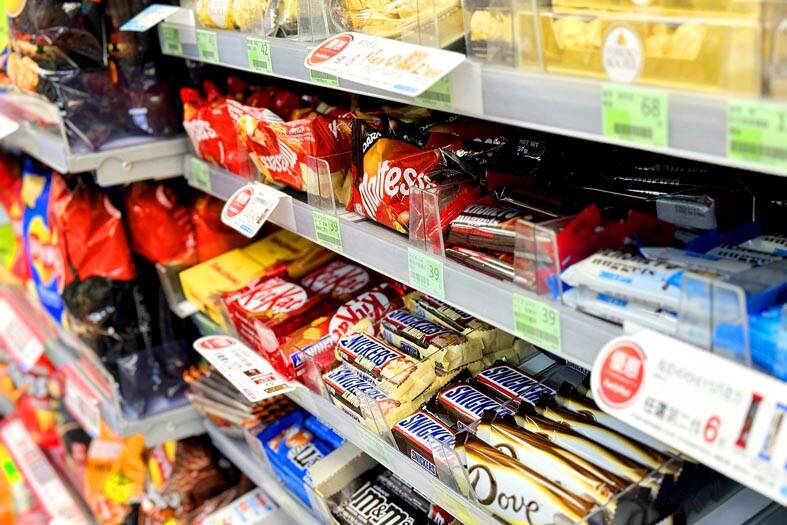Overall residual cadmium in chocolate is to be limited in line with international standards set by the Codex Alimentarius Commission, the Ministry of Health and Welfare said yesterday.
A draft amendment to the Sanitation Standard for Contaminants and Toxins in Food (食品中污染物質及毒素衛生標準) states that the total volume of dried coca solids, or powder, is to determine the residual cadmium amount in chocolate products.
The amendment separates the residual cadmium into five levels, stating that 20 to 30 percent of coca solids can only have 0.3mg/kg of residual cadmium, 30 to 50 percent can have 0.7mg/kg, 50 to 70 percent can have 0.8mg/kg, 70 percent and above can have 0.9mg/kg, and cocoa powder can have 2mg/kg.

Photo: Chiu Chih-jou, Taipei Times
The amendment was proposed citing George Washington University research showing that more than 40 percent of dark chocolate products have been contaminated by lead and cadmium, with some products having more than 6.5 times the permitted amount of residual heavy metals.
The Consumer Foundation inspected dark chocolate products for heavy metal residuals last year. It found that select products exceeded the suggested amount and that the ministry had no standing regulations to curb excess heavy metals in chocolate products.
Food and Drug Administration Deputy Director-General Lin Chin-fu (林金富) said that the amount of residual cadmium is determined by the species of cocoa beans used, the environment they grew in and the total amount of cocoa solids used.
Lin said that international regulations often use the amount of cocoa solids as the basis for regulatory policies.
As the majority of chocolate products in Taiwan are imported, the agency would solicit opinions and, if necessary, introduce further amendments to uphold food security, he said, adding that there would be a 60-day period, which started yesterday, to gather public and expert opinions.
Provided the draft amendment does not provoke a backlash, it is expected to be promulgated by Jan. 1 next year, Lin said.
All chocolate products in circulation are expected to comply with the new standards upon its promulgation, regardless of manufacturing date, he said.
Additional reporting by CNA

Taiwan is to have nine extended holidays next year, led by a nine-day Lunar New Year break, the Cabinet announced yesterday. The nine-day Lunar New Year holiday next year matches the length of this year’s holiday, which featured six extended holidays. The increase in extended holidays is due to the Act on the Implementation of Commemorative and Festival Holidays (紀念日及節日實施條例), which was passed early last month with support from the opposition Chinese Nationalist Party (KMT) and Taiwan People’s Party. Under the new act, the day before Lunar New Year’s Eve is also a national holiday, and Labor Day would no longer be limited

COMMITMENTS: The company had a relatively low renewable ratio at 56 percent and did not have any goal to achieve 100 percent renewable energy, the report said Pegatron Corp ranked the lowest among five major final assembly suppliers in progressing toward Apple Inc’s commitment to be 100 percent carbon neutral by 2030, a Greenpeace East Asia report said yesterday. While Apple has set the goal of using 100 percent renewable energy across its entire business, supply chain and product lifecycle by 2030, carbon emissions from electronics manufacturing are rising globally due to increased energy consumption, it said. Given that carbon emissions from its supply chain accounted for more than half of its total emissions last year, Greenpeace East Asia evaluated the green transition performance of Apple’s five largest final

Taiwan is to extend its visa-waiver program for Philippine passport holders for another year, starting on Aug. 1, Minister of Foreign Affairs Lin Chia-lung (林佳龍) said on Friday. Lin made the announcement during a reception in Taipei marking the 127th anniversary of Philippine independence and the 50th anniversary of the establishment of the Manila Economic and Cultural Office (MECO) in Taiwan, the Ministry of Foreign Affairs said. The decision reflected Taiwan’s commitment to deepening exchanges with the Philippines, the statement cited Lin as saying, adding that it was a key partner under the New Southbound Policy launched in 2016. Lin also expressed hope

Temperatures in New Taipei City’s Sindian District (新店) climbed past 37°C yesterday, as the Central Weather Administration (CWA) issued heat alerts for 16 municipalities, warning the public of intense heat expected across Taiwan. The hottest location in Taiwan was in Sindian, where the mercury reached 37.5°C at about 2pm, according to CWA data. Taipei’s Shilin District (士林) recorded a temperature of 37.4°C at noon, Taitung County’s Jinfeng Township (金峰) at 12:50 pm logged a temperature of 37.4°C and Miaoli County’s Toufen Township (頭份) reached 36.7°C at 11:40am, the CWA said. The weather agency yesterday issued a yellow level information notice for Taipei, New